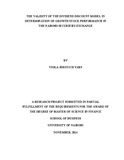| dc.description.abstract | The widespread lack of investor education on stock market investment and persistent information
asymmetry in the securities market in Kenya and in the greater financial world has cost investors a
pretty penny, and they have incurred great financial loss while making their investment decisions. This
study contributes by finding out what one of the methods of investment analysis; the dividend discount
model can contribute to solving this investment problem. The purpose of this project was to determine
the validity of the dividend discount model in determination of growth stock performance in the Nairobi
Securities Exchange. The DDM assumption of multiple growth periods was tested to evaluate its validity.
Stratified sampling was used in the sample selection for the study.
The research involved a historical longitudinal study of the financial data released by the listed growth
stock firms in the NSE. The population of the study comprised 17 growth stocks listed in the Nairobi
Securities Exchange as at 31st December 2013. The research relied upon secondary data obtained from
the Nairobi Securities Exchange, and financial reports of the growth stock firms obtained from the
Capital Markets Authority. High frequency data (monthly) was obtained for the bid prices of the stock.
The period of study was the four year period between January 2008 and December 2013. The data
collected was for 15 growth stock firms out of a possible 17, thus an overall success rate of 88.2%.
The data was analyzed using descriptive analysis, propensity score matching and multiple regression
analysis using SPSS. The results revealed that the DDM obtained from historical financial data of a
growth stock had a weak positive significant correlation with actual stock returns (0.949). The study also
found that market beta had a weak negative insignificant relationship with the DDM (-0.58). There is
also a weak negative insignificant relationship between market beta and the actual stock return value of
-0.001.
The study recommends that in order for investors to make the best investment decisions regarding
growth stocks in the NSE, the DDM model may be used in order to obtain a descriptive forecast of
investment returns in such instruments, use of the CAPM model which heavily relies on market beta is
however not advised. The study also recommends that there is also need to identify the growth stocks
as prime investment ventures while taking caution to perform fundamental analysis of the company
financials for the particular growth stocks. | en_US |

